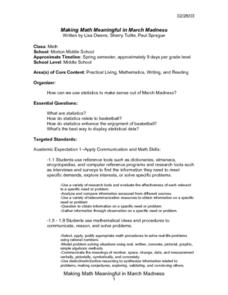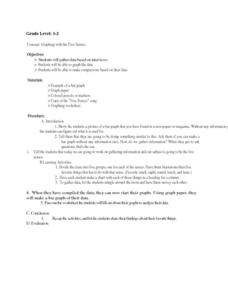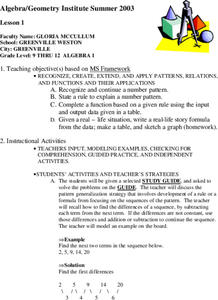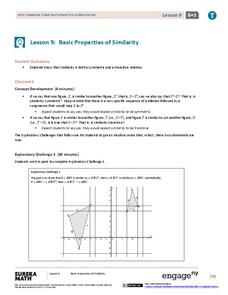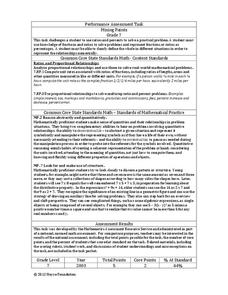Curated OER
Making Math Meaningful in March Madness
Students examine the statistics of March Madness, the college basketball tournament. They watch videotaped basketball games to collect data for further analysis using Word and Excel. They analyze the data in a variety of activities...
Curated OER
Technology Integrated Lesson
Students investigate symmetry in the real world. In this geometry lesson, students inter-relate math and technology. They create and name a variety of polygons.
Curated OER
VARIABLES AND PATTERNS, USE AFTER INVESTIGATION THREE. DISCRETE OR CONTINUOUS LINEAR RELATIONS.
Students discover for which kind of linear function is appropriate to use the "scatter" or the "connected" term. For this lesson, students investigate functions using variables, patterns book, graph paper, rulers and the graphit program.
Curated OER
Too, Two, To
In this too/to/two worksheet, students read a story about going to the zoo that has 25 missing words. Students fill in each blank with either to, two or too.
Curated OER
Cent Sense
Students identify money values. In this money lesson, students sort and group coins by value and investigate the cost of supplies needed for a snack. Students prepare snacks for a snack sale.
Curated OER
Number Operations
Fourth graders examine the relationship between multiplication and division and subtraction and division, and determine which operation is needed to solve various problems. They observe and participate in a teacher-led lecture, and...
Curated OER
Common Sense Cookie Shop
First graders shop for a bag of cookies using toy money. In teams, they choose which variety to buy and decides which bills and coins are necessary to buy the bag of cookies and a cashier makes change. They tally the cookies purchased...
Curated OER
Graphing with the Five Senses
Students collect data and record it on a bar graph. In this data graphing instructional activity, each small group of students is assigned to collect data on one of the five senses. They then practice a song that helps them remember the...
Curated OER
Out of This World
In this giving change worksheet, 3rd graders figure out the translation of Bruke money to American money. Students answer 3 word problems related to Bruke money.
Curated OER
Patterns, Relations, and Functions
Students investigate the patterns of different data sets of numbers. They use critical thinking skills in order to find the missing numbers in any given set. This instructional activity helps to develop the skill of number sense.
Curated OER
Estimating Solutions to Word Problems
Fourth graders explore number sense by completing word problems in class. In this estimation lesson, 4th graders define terms such as sum, difference, estimate and best. Students complete estimating worksheets based on the concept of...
Curated OER
Mixed Numbers and Decimals
In this number sense activity, 4th graders write mixed numbers as decimals in 6 problems. They begin with mixed numbers both in word and standard form and write each as a decimal.
Curated OER
Counting Blood Cells
Students observe number sense by participating in an estimation activity. In this blood cells lesson, students identify the importance of blood cells in the human body and discuss how tiny they are. Students utilize paper dots as a...
Curated OER
Do Touch!
Students explore the sense of touch. They investigate unknown solids using the sense of touch. Pupils use their senses of touch to match feely gloves. Students explore body parts, by tracing their hands and feet on paper. They create a...
EngageNY
Basic Properties of Similarity
Does the symmetry and transitive property apply to similarity? The 10th segment in a series of 16 presents the class with a group of explorations. The explorations have pairs show that similarity is both symmetrical and transitive....
EngageNY
An Application of Linear Equations
Just how far will the Facebook post go? Lead a discussion on how to manipulate the sum of a geometric series to figure out a formula to find the sum at any step. The plan contains an alternative to the discussion with more...
EngageNY
Applications of the Pythagorean Theorem
Begin seeing the world through the lens of geometry! Use the 19th installment in a 25-part module to apply the Pythagorean Theorem to solve real-world problems. Individuals sketch situations resulting in right triangles such as the...
EngageNY
The Mean as a Balance Point
It's a balancing act! Pupils balance pennies on a ruler to create a physical representation of a dot plot. The scholars then find the distances of the data points from the balance point, the mean.
EngageNY
The Graph of a Function
Mathematics set notation can be represented through a computer program loop. Making the connection to a computer program loop helps pupils see the process that set notation describes. The activity allows for different types domain and...
EngageNY
Mixture Problems
What percent of the mixture is juice? Pairs use their knowledge of proportions to determine what percent a mixture is juice given the percent of juice in the components. Pupils use the procedure learned with the juice mixture problem to...
Kenan Fellows
Introduction to a Flight Computer
Keep your hands on the wheel—at all times! Scholars learn why pilots use a flight computer through a high-flying demonstration. Making calculations for speed, distance, or time is automatic if you know how to use a flight computer.
EngageNY
Multiplication of Numbers in Exponential Form
Develop a solid understanding of multiplication and division properties of exponents. Individuals expand exponential terms to discover the patterns and create the properties in the second installment in a series of 15. The activity...
Noyce Foundation
Mixing Paints
Let's paint the town equal parts yellow and violet, or simply brown. Pupils calculate the amount of blue and red paint needed to make six quarts of brown paint. Individuals then explain how they determined the percentage of the brown...
Noyce Foundation
Sewing
Sew up your unit on operations with decimals using this assessment task. Young mathematicians use given rules to determine the amount of fabric they need to sew a pair of pants. They must also fill in a partially complete bill for...
